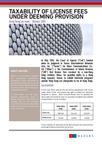
October 2015 - Taxability of License Fees Under Deeming Provision
Kong resident, Muse, for granting rights to a Hong Kong taxpayer, Turner, to exhibit television programs outside Hong Kong are chargeable to tax in Hong Kong.
BACKGROUND
In this case, Muse entered into two license agreements with Turner under which Turner was granted the right to exhibit four television programs in Taiwan. Muse received license fees for granting the above right and technical costs for provision of dubbed and subtitled programming to Turner as follow.
2005/2006 (US$)2006/2007(US$)2007/2008 (US$)License fees380,455274,635269,250Technical costs15,60015,30015,000
Turner claimed tax deduction on the above license fees and technical cost paid to Muse in it's profit tax returns.
ISSUE IN DISPUTE
Turner declared nil assessable profits in the non-resident profits tax returns in respect of Muse for the years of assessment 2005/2006, 2006/2007 and 2007/2008 as Turner considered that the license fees and technical costs are offshore sourced income to Muse on the following grounds:
(a) The underlying television program rights were licensed to Turner for exhibition in Taiwan only and therefore those license fees were not rece- ived for the exhibition or use of licensed televi- sion programs in Hong Kong. As such, the license fees are not subject to profits tax under Section 15(1)(a)1of the Inland Revenue Ordinance (“IRO”).
(b) The subject television program exhibitions rights did not fall within the ambit of Sections 15(1)(b) and/or 15(1)(ba). Sections 15(1)(b)2 and 15(1)(ba)3 are only relevant to license fees other than the television program license fees covered by Sec- tion 15(1)(a).
(c) The technical fees paid to Muse were for the pro- vision of dubbing and subtitling services perform- ed outside Hong Kong and therefore they are not subject to profits tax under Section 14 of the IRO.
The Assessor however assessed the license fees and technical costs paid by Turner to Muse are chargeable to profits tax under Section 15(1)(ba) and raised profits tax assessments on Muse in the name of Turner in the amounts of HK$161,516, HK$118,111 and HK$91,219 for the years of assessment 2005/2006, 2006/2007 and 2007/2008 respectively.
Turner lodged objection against the above assessments. Nevertheless, by the Determination, the Deputy Commissioner of Inland Revenue (“CIR”) confirmed the above assessments.
Turner on behalf of Muse appealed to the CIR’s determination. As agreed between Turner and CIR, the appeal was transferred to be heard by the Court of First Instance (“CFI”) directly pursuant to Section 67 of the IRO.
The CFI ruled that the license fees are subject to profits tax under Section 15(1)(ba). However, it ruled that the technical costs were not chargeable under Section 15(1)(ba) and should not have been included in the assessment of the profits.
Turner appealed to the Court of Appeal (“CoA”) in relation to the taxability of license fees under Section 15(1)(ba). On the other hand, the CIR was content with the decision with CFI and did not cross-appeal in relation to the non-taxability of technical costs.
Decision of Court of Appeal
Argument of Turner at the CoA
Counsel of Turner essentially repeated the same arguments, which he used at the CFI, at the CoA, i.e. there had been no relevant use of the television programs within the meaning of Sections 15(1)(b) and 15(1)(ba) and the above Sections did not cover fees paid for the use of media works.
No relevant use of the television programs within the meaning of Sections 15(1)(b) and 15(1)(ba)
The use in Sections 15(1)(b) and 15(ba) was to be understood in a technical intellectual property sense as referring to the exclusive right which ownership of the intellectual property conferred on the owner to use it, rather than in some broad (or ordinary) economic sense of employing, utilising or otherwise deriving benefit from the deployment of something. It was pointed out that (with the exception of computer programs) use of copyright material did not amount to infringement of the copyright owner’s rights, and submitted that Sections 15(b) and 15(ba) could only (in relation to copyright materials) cover payments made for the use of or right to use computer programs, and accordingly did not cover payments made for the right to use the television programs.
In addition, as Section 15(1)(a) referred both to the “exhibition” and “use” of cinematograph or television film or tape, or sound recording (collectively referred to as “media works”), there must have been intended to be a difference between “exhibition” and “use”, so that “use” did not include “exhibition”. Accordingly, “use” in Sections 15(1)(b) and 15(ba) should be given the same meaning as under Section 15(1)(a), i.e. “use” does not include exhibition of media works, which was the subject matter of the licence fees in this case.
Media work was not covered by Sections 15(1)(b) and 15(1)(ba)
Sections 15(1)(b) and 15(1)(ba) did not cover the fees paid for the use of media work which fell exclusive within Section 15(1)(a). As Turner only had the right to exhibit television programs outside Hong Kong in Taiwan, the licence fees were also not subject to profits tax under Section 15(1)(a).
Decision of CoA
The meaning of “use” does not require technical meaning
The CoA pointed out that Sections 15(1)(b) and 15(ba) cover a variety of forms of intellectual property which is already a factor that militates against the adoption of technical and limited meanings of use in relation to each type of intellectual property because using technical interpretation of use would require the “use” to be given different meaning or content in relation to the different forms of intellectual property listed in the same provision.
The CoA also pointed out that Sections 15(1)(b) and 15(ba) refer to “copyright materials” instead of “copyright materials in the form of computer programs”. As such, it is not right to adopt a meaning of “use” which only covers computer programs and then most types of copyright materials will not be covered by the above Sections, when no such limitation is expressed in these Sections themselves.
The CoA further noted that Sections 15(1)(b) and 15(1)(ba) are deeming Sections with a purpose of revenue protection by providing for certain situations not otherwise assessable to profits tax. As such, it does not require technical meanings, applicable in other areas of law, to be imported into these Sections.
The meaning of “use” includes “exhibition”
The CoA considered that the phrase “exhibition or use” in Section 15(1)(a) should be read as meaning “exhibition or other use”, with the word “other” being omitted because the sense of the provision remains the same whether or not it is included. Accordingly, “use” in Section 15(1)(a) would clearly encompass “exhibition”.
The CoA further stated that in any event, even if the word “use” in Section 15(1)(a) were to be given the restricted meaning for which the Counsel of Turner contends, it would not be appropriate to transpose that restricted meaning to Sections 15(1)(b) and 15(ba), which deal with a wider range of forms of intellectual property.
In view of the above, the CoA held that there was no “use” of the television programs within the meaning of section 15(1)(ba) should not be acceded to.
“Media works” are covered by Sections 15(1)(b) and 15(1)(ba)”
The CoA noted that there are two differences between Sections 15(1)(a) and 15(b) which show that the two Sections deal with different things. However, they might overlap in some respects, i.e. they are not mutually exclusive.
Firstly, Section 15(1)(a) relates to sums derived “from the exhibition or use in Hong Kong of cinematograph or television film or tape …”, whereas Sections 15(1)(b) and 15(ba) are concerned with sums received “for the use of or right to use” the various forms of intellectual property or similar things. The word “for” in Sections 15(1)(b) and 15(ba) meant “in return for” and implied that the relevant use is by or the right to use has been conferred upon, someone else other than the owner of the intellectual property in question.
In view of the above, Section 15(1)(a) more naturally relates to a situation in which the owner of the film or sound recording is involved (perhaps together with others) in the exhibition or other use of it, whereas Sections 15(1)(b) and (ba) relate to a situation where he is not, or at lease where the use is by another, or the right to use it is conferred on another.
Secondly, the CoA held that Section 15(1)(a) refers to the “exhibition or use” of the “media works” which would seem to require the actual exhibition or use of such “media works”, and that the sums be generated from the exhibition or use itself, rather than from a licensing arrangement under which payment is made by someone other than the owner for the use of (or right to use) the “media works” in question.
In view of the above, under Sections 15(1)(b) and 15(ba), fees paid would be assessable even if the licensee did not exhibit the “media works” or use the intellectual property the right to use which was the consideration for the fees. If “media works” is excluded from the ambit of intellectual property covered by Section 15(1)(b) and 15(ba), the fees paid for the right to exhbit or use media works but that right was not, for whatever reason, exercised, would not be assessable, whereas fees paid for the right to use all other forms of copyright materials or intellectual property would be assessable.
In view of the above, the CoA dismissed Turner’s appeal.
Comments
Based on the decisions made by the CFI and CoA, the phrase “use” under Sections 15(1)(a), 15(1)(b) and 15(1)(ba) should be interpreted under ordinary language instead of technical sense. In addition, the above Sections are intended to deal with different situations and need not be mutually exclusive.

